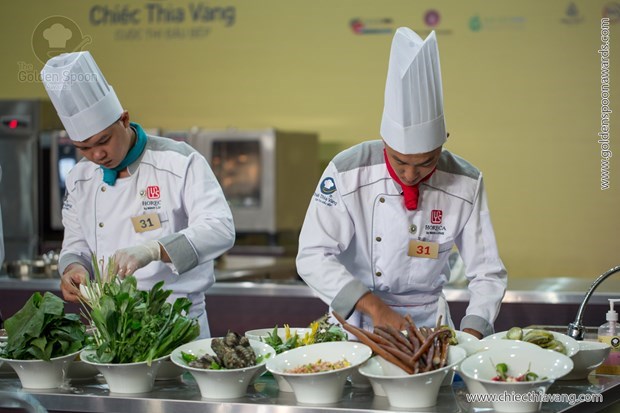
Young chefs from Sea Links City company always work in detail in The Golden Spoon contest.
Chef
lead Dao Minh Hoa said with his Binh Thuan ascent, “After a round, my hair got
whiter. Too many things to handle, from finding ingredients to complete cooking
process. A dozen times of cooking could not satisfy me yet”
During
November, the team was so busy preparing the next round’s menu and completing
new dishes in Sea Links official menu. In the semi-final round, all 4 dishes of
Sea Links team, which carried and passed on their homeland’s cha were deserved
to introduce to domestic and international visitors.
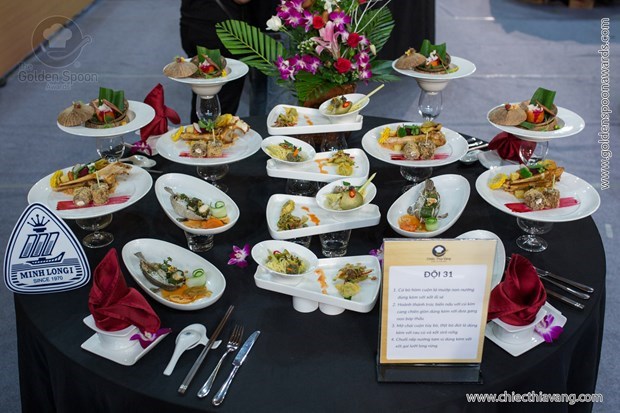
The winning menu of team 31 includes: 1) Grilled young sponge gourd leaves wrapped coffin fish, served with guava sauce; 2) Sea pangolin wonton and Kim Cang root, served with marinated young melon; 3) Leaf lard rolled beef marrow and baked beef tenderloin, served with vegetable in syrup fruit sauce; 4) Grilled banana wrapped in sweet-rice with 3 flavors in wild tongue cactus sauce.
The
first dish – Grilled young sponge gourd leaves wrapped coffin fish in guava
sauce – included 3 unique ingredients as coffin fish, young sponge gourd leaves,
and guava. Coffin fish is a famous specialty in La Gi beach (Binh Thuan
province). Local people named this fish as his weird appearance with
rectangular outer skeleton. It was also called “sea chicken” because of its
flesh – white and firm as chicken. Except the spiral bone, the whole body of
coffin fish is fleshy and boneless. Especially, its flesh is not fishy at all.
The team had to pre-order this type of fish to get the freshest from the sea at
220,000 vnd per kg.
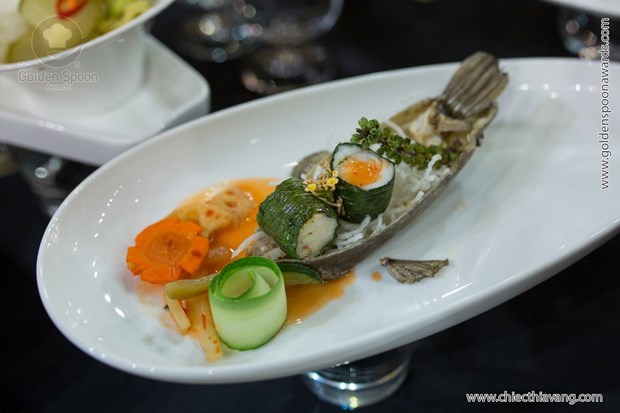
Grilled young sponge gourd leaves wrapped coffin fish in guava sauce.
Coffin
fish rolled with young sponge gourd leaves had an impressive aroma. Born in
1989 at an unproductive countryside, the chef was used to rustic dishes from
backyard vegetables, such as boiled sponge gourd tips with fish in hot pot or
grilled young sponge gourd with fish. The scent of this typical leave and
coffin fish really stimulated the taste. The mark was thick guava sauce, which
was made from ripe toe-sized guava – a wild fruit with red core and sweet and sour
taste. Guava was peeled, cored, grinded, and combined with chopped pepper, lime
juice, fish sauce, MSG, salt, and sugar to taste.
In
the second dish, another exotic ingredient was introduced, Sea-pangolin wonton
and Kim Cang root, served with marinated young melon. Follow the locals, the
team had reached inhabitant sea around Bau Trang region, where was rocky and
crystal clear. Every month, on 22nd – 26th in Lunar calendar, people can find
sea-pangolin from 10am to 4am in that area. This weirdo was found lately and
named as its odd shape, which had a back like pangolin and a bottom like
abalone. All 3 members of the team caught those sea-pangolins themselves.
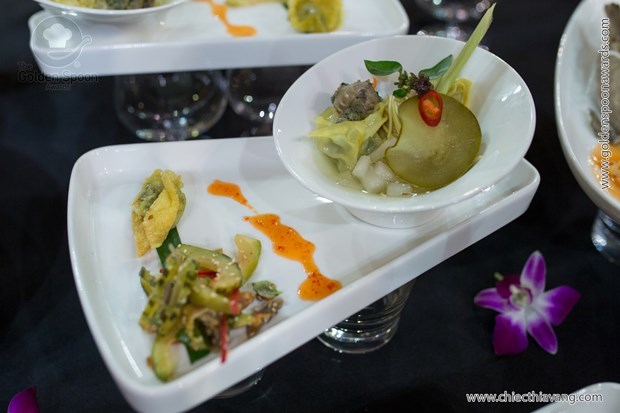
Sea-pangolin wonton and Kim Cang root, served with marinated young melon.
Sea-pangolin
flesh was mixed with pork paste at 8:2 ratio, then added chopped Whesl onion,
wild purslane, and seasonings to make wonton filling. Boiling water of
sea-pangolins would be seasoned with lemongrass, hot peppers, and Kim Cang
root. Kim Cang is also a new yet useful culinary produce. Raw Kim Cang roots
are jicama-like, but crunchier. Folk tales said that Vietnamese soldiers had
survived in forests because of these magical roots. When it’s ready, chefs
added a tablespoon of pickled melon water to taste. The side dish was marinated
young melon, which to balance out the fishy broth.
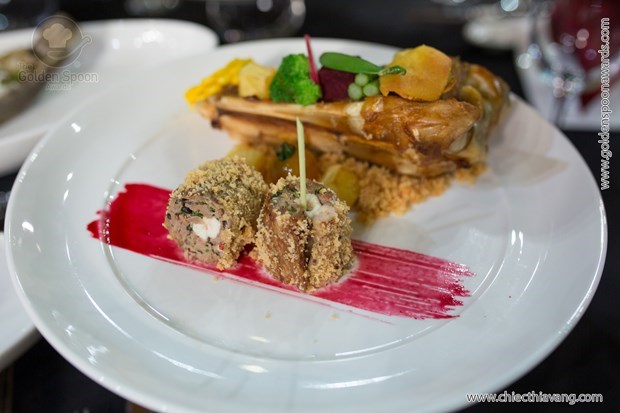
Leaf lard rolled beef marrow and baked beef tenderloin, served with vegetable in syrup fruit sauce.
Team
31’s chefs invested a lot in sauces. Their ingredients ranged from familiar
fruits (guava) to wild produce, such as tongue cactus and syrup fruits. Syrup
fruits are toe-size, pinky, and mature fruits turn purple with sour taste. It
was sophisticated to make this sauce. First, they burnt red wine and sugar to
make caramel then cooked syrup fruits in this caramel on low fire to get rid of
sourness. After that, they added salt, black pepper, and butter to taste. This
sauce is exotic with sourness of syrup fruits, sweetness of caramel, and
salted.
This
dish - Leaf lard rolled beef marrow and baked beef tenderloin, served with
vegetable in syrup fruit sauce – had been cooked 15 times to complete its
recipe. In some first trials, the chefs rolled beef marrow and beef (marinated
with cinnamon and ginger) in pork skin then steamed before baking but the
result came out with chewy texture. When the deadline came closed, they had come
up with leaf lard wrapper and the final product was perfect.
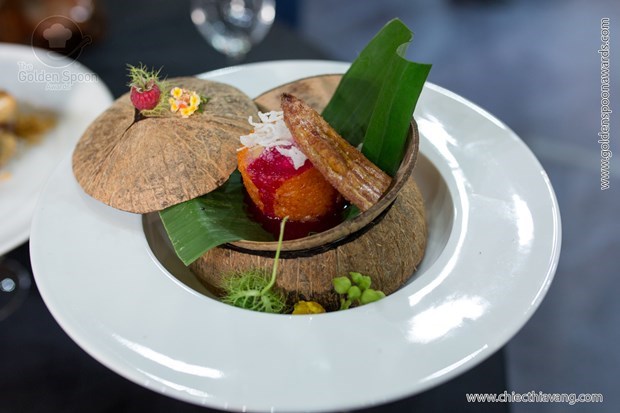
Grilled banana wrapped in sweet-rice with 3 flavors in wild tongue cactus sauce.
The
lead chef’s homeland specialties appeared on classy party table as Grilled
banana wrapped in sweet-rice with 3 flavors, served with wild tongue cactus
sauce. English restaurants started using cactus leaves, branches, and fruits to
make salads, sandwiches, or juices. Cactus juice and cactus jam has begun their
shelf lives in gourmet markets lately. In this dessert, tongue cactus was
cleaned and slow-cooked in sugar and fresh coconut milk to make sauce while
bananas were burnt in red wine before being wrapped in sweet-rice. The dessert
was an impressive combination.
After
all, their efforts of finding, discovering, and relentless practicing had paid
off. Team 31 with chef Dao Minh Hoa, Nguyen Van Ninh, and Nguyen Van Anh
finally subdued the jury to seize a ticket to the final round.
By P.Vi